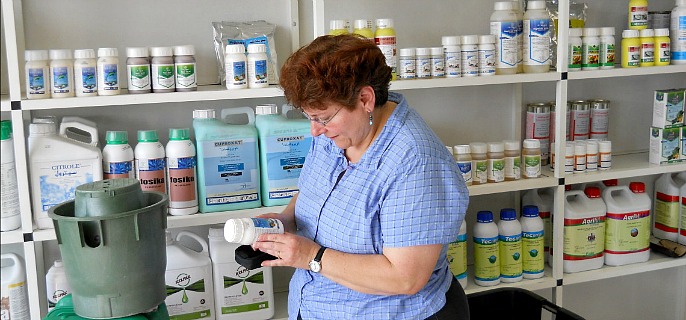
PHOTO COURTESY OF THE ODA
The Oregon Department of Agriculture’s Pesticides Program finds itself in a much stronger position to address issues and concerns from the public thanks to some help from the Oregon Legislature.
The newly-enhanced program comes courtesy of the 2015 state legislature and includes four new pesticide investigators, an additional case reviewer, a newly created citizens advocate position, and a hotline that operates 24 hours a day, 7 days a week.
“In recent years, there has been greater awareness of pesticide use practices in Oregon,” says Dale Mitchell, manager of ODA’s Pesticides Program. “The new resources for our program is a sign from the legislature and the citizens of Oregon that pesticide use activities and the compliance of regulations is a very important focus.”
One of the more hotly debated issues of last year’s legislative session was aerial application of pesticides. As a result of extensive legislative discussion to address laws pertaining to aerial application, ODA ended up with additional resources in its Pesticides Program, all paid for by fee increases on pesticide product registration. HB 3549 addressed a number of pesticide related issues. In addition to the newly budgeted ODA positions, the bill established new licensing requirements for aerial pesticide applicators and the establishment of the 24-hour telephone hotline to handle pesticide complaints and concerns.
The four new pesticide investigators join the nine that have been working tirelessly to respond to an increasing workload the past several years. As a result, ODA will now be able to increase its routine monitoring of pesticide applicators as well as handling complaints.
“This will provide for a quicker response to complaints and inquiries, and greater opportunities to educate and ensure that pesticide applicators are in compliance with the law,” says Mitchell.
The term used within the program is “compliance assistance.” Mitchell sees it as a way to keep problems from ever happening.
“We want the staff to be out there on the ground interacting with the industry as pesticide applications are occurring. In that mode, we are able to actually prevent violations, through compliance assistance, instead of simply responding to a complaint after the fact. We hope these additional resources, while working with applicators in a more proactive and real time situation, will be more beneficial from a prevention standpoint.”
The extra investigators will reduce the heavy workload that had fallen on the shoulders of the existing team. That should lead to a more timely pesticide investigation and resolution of the matter that is expedient as possible.
The new citizens advocate position has been filled with the hiring of Christina Higby. Her primary job will be a point of contact for people who feel they’ve been impacted by pesticide application activities. Technically, the position is part of the Pesticide Analytical and Response Center (PARC)– a multi-agency group which coordinates investigations to collect and analyze information about reported pesticide incidents. The agencies, which include ODA, the Oregon Health Authority, and six other members, conduct most of the investigations and take any necessary enforcement action.
ODA’s Mitchell is pleased that the Oregon Legislature recognized an area of need for the agency.
“With these increased resources, I am confident that we will be able to address the public’s concerns and enhance the regulatory oversight of pesticide use in Oregon.”










